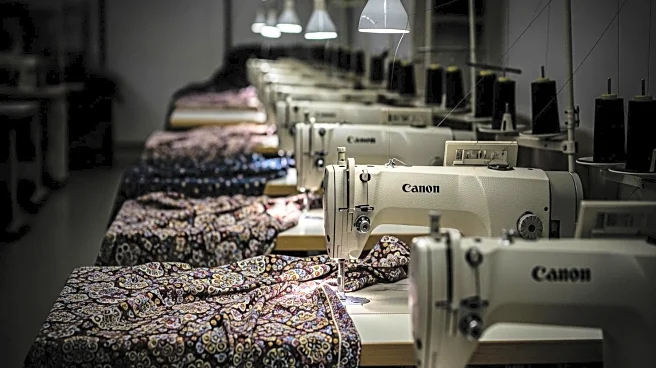What is the story about?
What's Happening?
The fast fashion industry is heavily reliant on low-cost labor, primarily in low- to lower-income countries such as Bangladesh, India, and Vietnam. This practice, known as offshoring, has led to a significant increase in female labor force participation in these regions, a phenomenon termed the 'feminisation of labour.' However, this has also resulted in precarious and unpredictable employment conditions for these workers. Many garment workers, predominantly women, face unsafe working conditions, low wages, and lack of basic rights such as maternity leave and adequate sanitation. The collapse of the Rana Plaza factory in Bangladesh in 2013 highlighted the severe risks faced by these workers. Despite some improvements, such as the International Accord for worker safety, significant challenges remain.
Why It's Important?
The exploitation of garment workers in the fast fashion industry has significant implications for global labor rights and gender equality. The industry's reliance on low-cost labor perpetuates a cycle of poverty and exploitation, particularly affecting women. This not only raises ethical concerns but also highlights the need for systemic change in how fashion brands operate. The issue is further compounded by the global supply chain's vulnerability to geopolitical and economic shifts, which can exacerbate the precarious conditions faced by workers. Addressing these challenges is crucial for ensuring fair labor practices and improving the livelihoods of millions of workers worldwide.
What's Next?
Efforts to improve conditions for garment workers include advocating for living wages, better workplace safety, and greater financial independence for women. Consumers can play a role by supporting ethical brands and using their voices to demand change. Additionally, there is a need for stronger regulatory frameworks and international cooperation to hold brands accountable for their supply chain practices. The potential for positive change exists, but it requires concerted efforts from governments, businesses, and consumers alike.
Beyond the Headlines
The fast fashion industry's impact extends beyond labor exploitation, contributing to environmental degradation and unsustainable consumption patterns. The industry's growth is projected to consume resources equivalent to two Earths by 2030, underscoring the urgent need for sustainable practices. Moreover, empowering women in the garment industry could have broader social benefits, as improving their economic status can uplift entire communities. This highlights the interconnectedness of labor rights, environmental sustainability, and social justice.

















